Words with synonyms
Have you ever struggled to find the perfect word to express yourself? Language is a powerful tool, but sometimes a single word just doesn’t capture the full depth of your meaning. Enter the world of words with synonyms! These linguistic gems offer a treasure trove of options, allowing you to elevate your writing, add nuance to your conversations, and impress your audience with a diverse and eloquent vocabulary.
The English language boasts a remarkable richness, offering multiple ways to express the same idea. These alternative terms, known as synonyms, provide writers and speakers with a vast toolbox to choose the most fitting word for the situation. Understanding synonyms goes beyond simply finding another word; it delves into the subtle differences in meaning, formality, and emotional connotations. By mastering this linguistic art, you can unlock a deeper level of communication and craft truly impactful messages.
15 other words to say Sad, Angry, or Disgurt
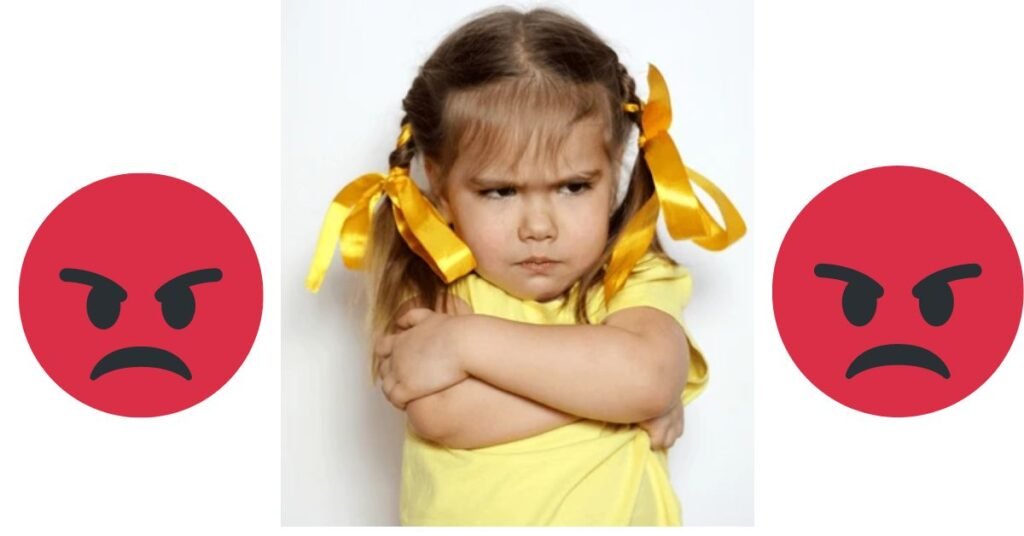
- Fed up:
mildly annoyed, a sign of frustration.
“I’m fed up with this weather”.
- Furious:
very annoyed.
“he drove at a furious speed”.
- Fuming:
extremely annoyed, to the point that you cannot express yourself calmly.
“she was fuming in anger”.
- Fit to be tied:
so angry that you cannot control yourself.
He was fit to be tied when she showed up an hour late.
- Hot under the collar:
mildly angry, feeling flushed.
When I suggested he was mistaken he got rather hot under the collar.
- Enraged:
full of anger.
“The students were enraged at these new rules”.
- Seething:
silently angry.
“We walked out, seething with rage”.
- Incensed:
extremely angry, to the point that you want to complain or take action.
“I was incensed that my friend, an astute judge of character, had said yes.”
- Outraged:
feeling or expressing strong anger or disgust.
“I was so outraged by the unfairness of the situation”.
- Irate:
very angry.
“there were hundreds of calls from irate viewers”.
- Pissed off:
very informal way to say angry.
He’d kept me waiting for an hour so I was pissed off to start with.
- Infuriated:
annoyed by something that keeps happening
“The increase in traffic has infuriated the local people”.
- Displeased:
a polite way to say angry.
“he was displeased with your work”.
- Go ballistic:
extremely angry, to lose control.
Dad went ballistic when he saw the dent in his car.
- Make your blood boil:
to become very angry.
When I hear stories of cruelty to animals, it makes my blood boil.
15 other words to say Happy

-
Cheerful (adjective):
Feeling or expressing good spirits and optimism.
The children were cheerful during the exciting game.
-
Delighted (adjective):
Feeling great pleasure and satisfaction.
She was delighted to receive the promotion at work.
-
Ecstatic (adjective):
Feeling or showing overwhelming joy and excitement.
The fans were ecstatic after their team’s victory.
- Elated (adjective):
Feeling intense happiness and exhilaration.
He felt elated after winning the competition.
-
Glad (adjective):
Feeling pleased and satisfied.
I’m glad you could make it to the party.
-
Gleeful (adjective):
Feeling or showing intense delight and amusement.
The children were gleeful as they opened their presents.
-
Joyful (adjective):
Full of joy and happiness.
The couple celebrated their wedding with a joyful ceremony.
-
Jubilant (adjective):
Feeling or expressing triumphant happiness.
The crowd erupted in jubilant cheers after the goal.
- Merry (adjective):
Cheerful and full of fun.
They had a merry time singing carols during the holidays.
-
Thrilled (adjective):
Feeling intense excitement and pleasure.
She was thrilled to be accepted into her dream college.
-
Upbeat (adjective):
Cheerful and optimistic.
He maintained an upbeat attitude despite the challenges.
-
Content (adjective):
Feeling satisfied and happy with your current situation.
They lived a simple life, content with what they had.
-
Blessed (adjective):
Feeling fortunate and happy due to good things in your life.
She felt blessed to have such a supportive family.
-
Sunny (informal adjective):
Cheerful and optimistic.
He has a sunny disposition and always looks on the bright side.
-
Tickled Pink (informal idiom):
Extremely pleased or delighted.
My grandma was tickled pink to receive her birthday flowers.
15 other words to say Ignore
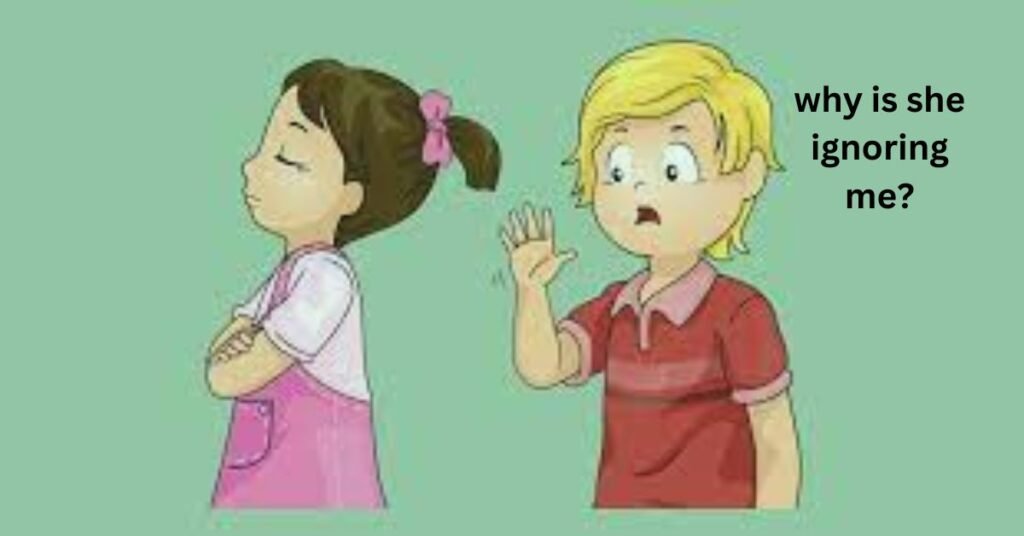
- Disregard:
(to treat something as unimportant)
“She disregarded the rude comments and continued her presentation.”
- Pay no attention to:
(to not focus on something)
“He paid no attention to the ringing phone as he was engrossed in the book.”
- Overlook:
(to deliberately not notice something)
“The teacher chose to overlook the minor mistake in the student’s homework.”
- Dismiss:
(to reject something as unimportant or invalid)
“He dismissed their concerns as unfounded.”
- Tune out:
(to stop listening actively)
“The audience began to tune out the speaker’s long-winded presentation.”
- Turn a deaf ear to:
(to deliberately refuse to listen to something)
“She turned a deaf ear to the gossip circulating around her.”
- Brush aside:
(to treat something as insignificant)
“He brushed aside her worries with a reassuring smile.”
- Leave unheard:
(to not listen to something)
“The judge left their pleas unheard due to lack of evidence.”
- Put aside:
(to temporarily ignore something)
“Let’s put aside this issue for now and focus on the bigger problem.”
- Pass over:
(to not consider something)
“The committee passed over his application in favor of a candidate with more experience.”
- Let slide:
(to allow something to happen without addressing it)
“The teacher decided to let the minor disruption slide this time.”
- Minimize:
(to make something seem less important)
“He tried to minimize the impact of his mistake by offering an apology.”
- De-prioritize:
(to place something lower on the list of importance)
“Due to the urgent deadline, we had to de-prioritize this task for now.”
- Pigeonhole:
(to categorize something and not give it further consideration)
“He pigeonholed her request as unimportant and never followed up.”
- Consign to oblivion:
(to completely disregard and forget something)
“The outdated technology was consigned to oblivion with the advancement of newer devices.”
15 other words to say Big

- Large:
Generally larger than average.
The store had a large selection of books.
- Huge:
Very large, often exceeding expectations.
(Sentence: The waves were huge, crashing against the rocks.)
- Enormous:
Extremely large, almost unbelievable in size.
The ancient trees had enormous trunks.
- Immense:
Vast and immeasurable.
The desert stretched out before them, immense and desolate.
- Gigantic:
Enormous in size, like a giant.
The amusement park had a gigantic Ferris wheel.
- Colossal:
Extremely large, often awe-inspiring.
The statue was colossal, dwarfing the people around it.
- Massive:
Very large and solid.
The building was a massive structure of steel and glass.
- Spacious:
Having a large amount of usable space.
The house had a spacious living room.
- Voluminous:
Taking up a lot of space.
Her voluminous dress billowed as she walked.
- Substantial:
Large in size or amount.
He received a substantial pay raise.
- Extensive:
Large in scope or area.
The company had extensive landholdings.
- King-sized:
Extraordinarily large, often used for beds or other furniture.
They bought a king-sized bed for their guest room.
- Monumental:
Extremely large and impressive.
He had undertaken a monumental task of writing a historical novel.
- Prodigious:
Very large in amount or quantity.
The athlete had a prodigious appetite.
- Heft:
Significantly heavy or bulky.
The box had a heft to it, indicating it was full.
15 other words to say Beautiful

- Stunning (adj):
Strikingly beautiful, causing a feeling of surprise and admiration.
The mountain view was absolutely stunning, with snow-capped peaks reaching towards the sky.
- Breathtaking (adj):
Taking one’s breath away due to its beauty.
The intricate details of the artwork were breathtaking, leaving everyone speechless.
- Exquisite (adj):
Extremely beautiful and delicate, made with great skill and care.
The hand-crafted jewelry was exquisite, adorned with sparkling diamonds.
- Ravishing (adj):
Captivatingly beautiful, often in a dazzling or magnificent way.
The dancer’s performance was ravishing, her movements filled with grace and power.
- Ethereal (adj):
Delicately beautiful and otherworldly, seeming too perfect for this world.
The bride looked ethereal in her flowing white gown, a vision of pure elegance.
- Resplendent (adj):
Shining brightly and magnificently, radiating beauty and grandeur.
The peacock strutted proudly, its tail feathers resplendent in a dazzling array of colors.
- Picturesque (adj):
Like a beautiful picture, with a pleasing and harmonious arrangement of elements.
The quaint village nestled amidst rolling hills was a picturesque scene, perfect for a postcard.
- Alluring (adj):
Highly attractive and tempting, especially in a mysterious or subtle way.
The aroma of freshly baked bread was alluring, drawing everyone towards the bakery.
- Bewitching (adj):
Pleasantly charming and fascinating, capable of capturing one’s attention completely.
The musician’s melody was bewitching, weaving a spell that transported the audience to another world.
- Exquisite (adj):
Extremely beautiful and delicate, made with great skill and care.
The intricate details of the flower were exquisite, each petal a masterpiece of nature’s design.
- Elegant (adj):
Graceful and stylish in appearance, reflecting good taste and refinement.
The woman carried herself with elegance, her movements poised and confident.
- Luminous (adj):
Full of light and radiance, glowing with beauty.
Her smile was luminous, radiating warmth and kindness.
- Enchanting (adj):
Delightfully charming and captivating, arousing a feeling of wonder and pleasure.
The children’s laughter was enchanting, filling the air with joy and innocence.
- Serene (adj):
Calm, peaceful, and untroubled, possessing a quiet beauty.
The crystal-clear lake reflected the serene sky, creating a picture of tranquility.
- Mesmerizing (adj):
Holding one’s attention completely, as if under a spell.
The dancer’s movements were mesmerizing, her body flowing like water in perfect rhythm.
15 other words to say Many

- Numerous (adjective):
A large and unspecified amount.
Numerous birds were singing in the trees.
- Abundant (adjective):
Existing in large quantities.
The market had abundant fresh fruits and vegetables.
- Plentiful (adjective):
Existing in large amounts and readily available.
We had a plentiful harvest of apples this year.
- Myriad (noun):
An extremely large or indefinite number.
There are a myriad of stars in the night sky.
- A plethora (noun):
A large or excessive amount.
The writer had a plethora of ideas for the story.
- Copious (adjective):
Existing in large quantities.
The recipe called for copious amounts of cheese.
- Extensive (adjective):
Large in amount, scope, or range.
The library has an extensive collection of books.
- Ample (adjective):
More than enough; plentiful.
We have ample time to finish the project.
- Prolific (adjective):
Producing or capable of producing a large amount of something.
The author is known for being a prolific writer.
- Throngs (noun):
A large or dense crowd of people.
Throngs of people gathered for the parade.
- Multitude (noun):
A large, indefinite number of people or things.
A multitude of factors contributed to the company’s success.
- A profusion (noun):
A large or excessive amount of something.
The garden was filled with a profusion of colorful flowers.
- A smorgasbord (noun):
A large and varied selection of something.
The restaurant offered a smorgasbord of international dishes.
- A bounty (noun):
A plentiful amount of something desirable.
The farmers enjoyed a bounty of crops after the good harvest.
- Legion (noun):
A very large number of people or things.
There are legions of fans who follow this football team.
15 other words to say small

-
Tiny:
Extremely small.
“The baby held a tiny rattle in her hand.”
-
Minute:
Very small in size or amount.
“There was only a minute amount of milk left in the carton.”
-
Little:
Small in size, amount, or degree.
“The house had a little garden with a few flowers.”
-
Diminutive:
Very small.
“She wore a pair of diminutive earrings.”
-
Compact:
Small and neatly arranged.
“They lived in a compact apartment with efficient use of space.”
-
Miniature:
A very small version of something.
“He collected miniature model cars.”
-
Petite:
Of small but pleasing proportions (often used for women’s clothing).
“The dress had a petite cut, perfect for her small frame.”
-
Microscopic:
So small as to be seen only with a microscope.
“Scientists study microscopic organisms.”
-
Exiguous:
Very small in amount or quantity.
“There was an exiguous amount of food left after the party.”
-
Wee:
Very small (informal).
“The cottage had a wee porch with a swing.”
-
Stunted:
(of growth) prevented from reaching its normal size.
“The harsh conditions resulted in stunted crops.”
-
Diminutive:
Very small. (similar to diminutive but emphasizes the smallness)
“The hummingbird has a diminutive beak perfect for reaching flower nectar.”
-
Insignificant:
Very small or unimportant.
“The difference in price was insignificant.”
-
Trifling:
Of little importance or value.
“It was a trifling detail that most people wouldn’t notice.”
-
Concise:
Brief and to the point. (not exactly related to size, but emphasizes smallness in quantity of words)
“She gave a concise answer to the question.”
15 other words to say Ugly
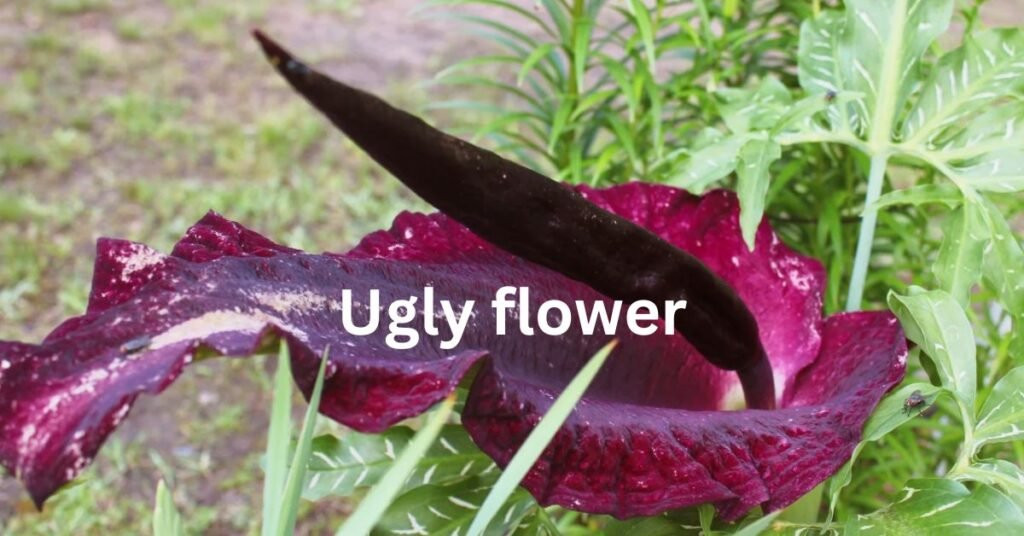
- Displeasing/Disagreeable:
These imply causing someone discomfort or disapproval, going beyond just appearance.
“The loud music coming from the bar was displeasing to the residents nearby.”
- Horrible:
Extremely unpleasant or shocking, far too strong for simply describing looks.
“The traffic accident caused a horrible scene, with debris scattered everywhere.”
- Unlovely:
Lacking in beauty or charm.
“The neglected garden had become unlovely, with weeds overtaking the flower beds.”
- Unprepossessing:
Not attractive or interesting at first glance.
“The small bookstore had an unprepossessing exterior, but held hidden treasures inside.”
- Unsightly:
Unpleasant to look at.
“The litter in the park created an unsightly mess.”
- Unattractive:
Lacking in qualities that are generally considered pleasing.
“The worn furniture gave the room an unattractive appearance.”
- Ill-favored:
Archaic term for unattractive; discouraged due to negative connotations.
The man was ill-favored” is usable, it’s crucial to acknowledge the potential negativity associated with “ill-favored.”
- Hideous:
Extremely ugly; and shockingly unpleasant to look at.
“The sight of the burning building was hideous, flames licking at the night sky and smoke billowing into the air.”
- Plain:
Lacking distinctive or elaborate features.
“She wore a plain black dress for the formal event.”
- plain-featured
Having ordinary or unremarkable features.
“The house had a plain-featured facade with symmetrical windows.”
- Deformed:
Misshapen
The tree’s branches twisted and deformed under the weight of heavy snow.
- Unappealing:
Unattractive.
The dish looked unappealing, with its bland colors and lack of aroma.
- Monstrous:
Frightening.
The storm unleashed its monstrous fury, tearing through the town with relentless force.
- Ghastly:
Horrifying.
His ghastly appearance, with pale skin and sunken eyes, startled everyone at the party.
- Revolting
Not good, bad looking.
This room is revolting the structure of the whole home.
15 other words to say Kind
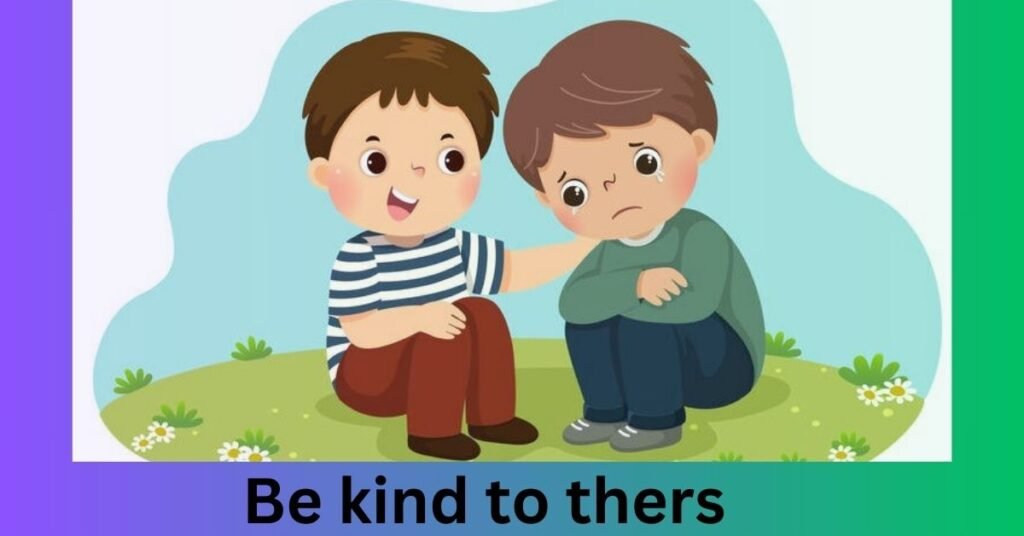
- Benevolent:
Wishing to do good
She had a benevolent smile as she offered help.
- Compassionate:
Feeling or showing sympathy and concern for others
He showed great compassion towards the sick child.
- Generous:
Willing to give freely
She was generous with her time and resources.
- Altruistic:
Selflessly concerned with the welfare of others
His act of donating blood was truly altruistic.
- Benevolent:
Wishing to do good
The benevolent king built schools for the underprivileged.
- Gracious:
Polite and courteous in a charming way
He received his guests with gracious hospitality.
- Considerate:
Showing careful thought for the feelings of others
It was considerate of her to bring you a gift.
- Gentle:
Kind and mild-mannered
The gentle giant helped the lost child find his way.
- Understanding:
Showing sympathy and a willingness to listen
She was an understanding friend who always offered support.
- Empathetic:
Able to share the feelings of others
He showed great empathy towards the grieving family.
- Nurturing:
Caring for and encouraging the growth or well-being of others
The nurturing teacher fostered a love of learning in her students.
- Charitable:
Concerned with helping the poor or less fortunate
He was a charitable man who donated to many worthy causes.
- Forgiving:
Willing or able to forgive others
She had a forgiving nature and didn’t hold grudges.
- Compassionate:
Feeling or showing sympathy and concern for others
The nurse treated her patients with great compassion.
- Affable:
Friendly, good-natured, and easy to talk to
He had an affable personality that made him well-liked.
15 other words to say Rude
- Blunt:
Direct and to the point, lacking tact.
“He gave his blunt opinion without considering the other person’s feelings.”
- Dismissive:
Minimizing or disregarding someone’s thoughts or opinions.
“She dismissively waved her hand at his suggestion.”
- Insensitive:
Unaware of or uncaring about the potential negative impact of words or actions.
“The insensitive remark made him feel uncomfortable.”
- Arrogant:
Excessively proud and self-important.
“His arrogant attitude alienated many colleagues.”
- Condescending:
Talking down to someone in a patronizing way.
“The condescending tone of her voice was off-putting.”
- Unprofessional:
Conduct that falls below expected standards in a work environment.
“His unprofessional behavior during the meeting was unacceptable.”
- Inconsiderate:
Lacking regard for the feelings or needs of others.
“It was inconsiderate of her to interrupt him constantly.”
- Abrasive:
Harsh or aggressive in communication.
“Her abrasive language created a tense atmosphere.”
- Belligerent:
Hostile and argumentative.
“His belligerent tone made it difficult to have a civil conversation.”
- Discourteous:
Lacking good manners or politeness.
“It was discourteous of him not to thank his host.”
- Derogatory:
Expressing disapproval or contempt (often used for language).
“The news report used derogatory terms to describe the protestors.”
- Patronizing:
Behaving in a way that suggests superiority and implies a lack of intelligence in the other person.
“He spoke to her in a patronizing tone, explaining things she already knew.”
- Flippant:
Treating serious matters with casual indifference.
“Her flippant response to the criticism indicated a lack of understanding.”
- Scathing:
Harshly critical, often using sarcasm or insults.
“The reviewer wrote a scathing critique of the new play.”
- Pretentious:
Attempting to impress by affecting greater importance, talent, culture, etc., than is possessed.
“His pretentious use of vocabulary made him sound inauthentic.”
15 other words to say Interesting
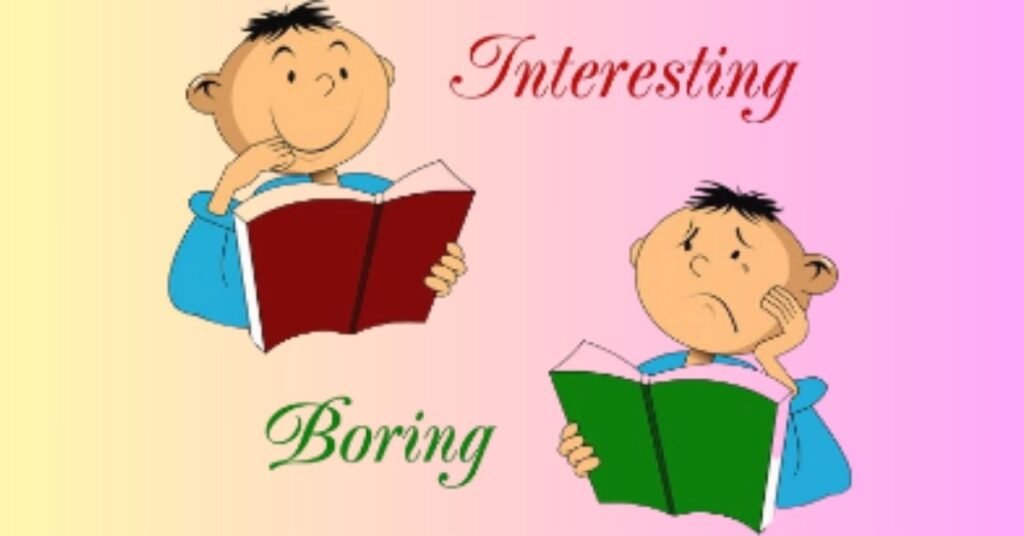
- Fascinating:
Highly captivating and absorbing.
“The documentary about ancient civilizations was utterly fascinating.”
- Compelling:
Holding one’s attention due to its forceful or impressive nature.
“Her presentation on sustainable energy solutions was compelling and sparked lively discussion.”
- Thought-provoking: Encouraging critical thinking and reflection.
“The article raised several thought-provoking questions about the future of artificial intelligence.”
- Engrossing:
Completely capturing one’s attention and interest.
“The book was so engrossing, I stayed up all night to finish it.”
- Intriguing:
Arousing curiosity and interest due to being mysterious or puzzling.
“The scientist’s theory about the existence of parallel universes was intriguing.”
- Inventive:
Showing originality and clever thinking.
“The artist’s use of recycled materials in her sculptures was inventive and inspiring.”
- Provocative:
Intended to stimulate discussion or challenge existing beliefs.
“The filmmaker’s documentary about social injustice was provocative and sparked important conversations.”
- Enlightening:
Providing new knowledge or understanding.
“The lecture on the history of chocolate was enlightening and broadened my knowledge.”
- Stimulating:
Arousing mental activity or interest.
“The class discussions were stimulating and encouraged us to think outside the box.”
- Captivating:
Holding one’s attention with irresistible charm or interest.
“The kids performance was captivating, leaving the audience speechless.”
- Noteworthy:
Worthy of attention or mention.
“The recent archeological discovery was a noteworthy development in our understanding of ancient civilizations.”
- Informative:
Providing useful or valuable information.
“The workshop on personal finance was informative and offered practical tips for managing money.”
- Compelling:
Forcing one’s attention by being powerful or impressive.
“The evidence presented in the trial was compelling and difficult to ignore.”
- Exhilarating:
Exciting and stimulating in a thrilling way.
“The rollercoaster ride was exhilarating and left me wanting more.”
- Gripping:
Holding one’s attention firmly, often due to suspense or excitement.
“The plot of the movie was gripping and kept me guessing until the very end.”
15 other words to say Boring
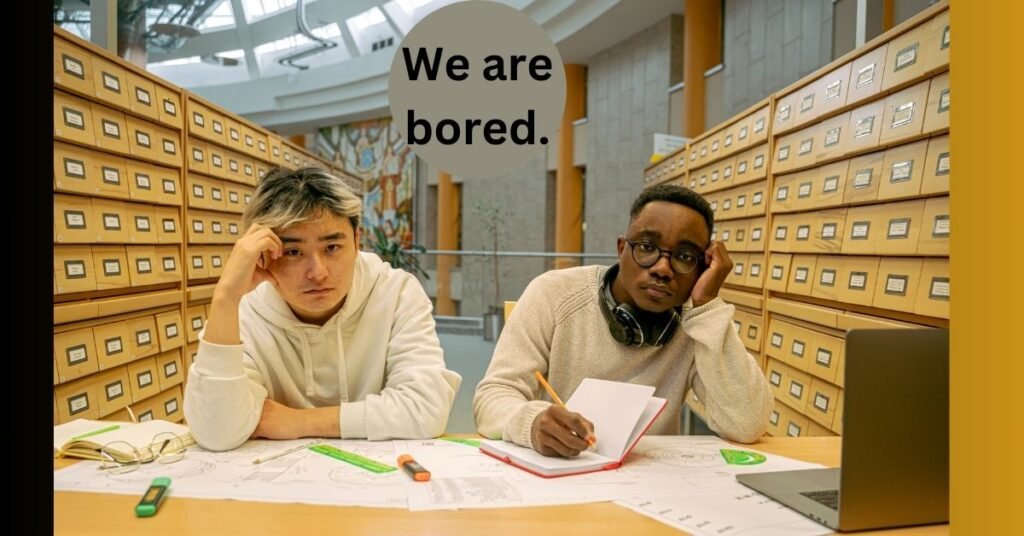
- Monotonous:
Lacking in variety or interest.
“The lecture was a monotonous drone of facts and figures.”
- Uneventful:
Without any noteworthy events or excitement.
“We had an uneventful day at the beach due to the bad weather.”
- Trite:
Overused and lacking originality.
“The movie plot was full of trite clichés.”
- Uninspiring:
Failing to stimulate or motivate.
“The uninspiring presentation put the audience to sleep.”
- Languid:
Slow, sluggish, and lacking in energy.
“The languid pace of the game made it difficult to stay engaged.”
- Stagnant:
Lacking development or progress.
“The conversation felt stagnant as we repeated the same points.”
- Pedestrian:
Ordinary and lacking in imagination.
“The pedestrian plot offered nothing new to the genre.”
- Soporific:
Tending to induce sleep.
“The speaker’s monotonous voice had a soporific effect on the audience.”
- Unremarkable:
Not worthy of special attention.
“The scenery was unremarkable, with just endless stretches of flat land.”
- Insipid:
Lacking flavor or interest.
“The insipid plot twist left the audience feeling disappointed.”
- Dreary:
Gloomy, depressing, and lacking in cheer.
“The rainy weather made for a dreary afternoon.”
- Listless:
Lacking enthusiasm or energy.
“The listless performance failed to capture the audience’s attention.”
- Uninviting:
Not appealing or attractive.
“The uninviting atmosphere of the restaurant made us want to leave.”
- Mundane:
Ordinary, commonplace, and lacking in excitement.
“His daily routine was a cycle of mundane tasks.”
- Tepid:
Lacking in warmth, enthusiasm, or excitement.
“The tepid response to the product launch indicated a lack of consumer interest.”
15 other words to say Old

- Mature:
Fully developed physically and mentally.
“The company seeks mature applicants for the leadership role.”
- Established:
Existing for a long time and well-recognized.
“This bakery is an established landmark in the town.”
- Seasoned:
Having extensive experience or knowledge.
“She’s a seasoned traveler with a wealth of stories.”
- Vintage:
Denoting the period something was made or from a particular era.
“This watch is a vintage timepiece from the 1950s.”
- Timeworn:
Showing signs of wear and tear due to age.
“The timeworn steps led up to the ancient castle.”
- Aged:
Matured over time, often used for things like wine or cheese that improve with age.
“This aged wine has a complex flavor profile.”
- Classic:
Enduring in style or quality.
“The little black dress is a timeless classic.”
- Antiques:
Objects of historical value, especially from a bygone era.
“They collect antiques and restore them to their former glory.”
- Outdated:
No longer in fashion or use.
“The company’s marketing strategies seem outdated compared to their competitors.”
- Obsolete:
No longer in use because something better exists.
“Floppy disks are now obsolete technology.”
- Decrepit:
In a state of advanced disrepair due to age.
“The decrepit building was condemned by the city.”
- Ancient:
Extremely old.
“He has an ancient collection of coins.”
- Old-fashioned:
Traditional and out-of-date in style.
“He prefers the old-fashioned way of doing things.”
- Superannuated:
Outmoded or outdated. “Their superannuated business practices hinder their growth.”
- Past one’s prime:
Beyond the best or most productive stage.
“The athlete is past his prime but remains a valuable coach.”
15 other words to say New

- Novel:
Completely new and original.
The scientist made a novel discovery in the field of medicine.
- Modern:
Up-to-date and following current trends.
She decorated her apartment in a modern style.
- Recent:
Having happened or been created lately.
This is a recent development in the ongoing negotiations.
- Fresh:
New and not previously used or experienced.
We need fresh ideas to tackle this problem.
- Emerging:
Coming into existence or prominence.
There are emerging technologies that could revolutionize transportation.
- Unprecedented:
Never done or experienced it before.
The global pandemic caused unprecedented challenges for businesses.
- Contemporary:
Belonging to or occurring in the present time.
The museum showcased contemporary art pieces.
- Unfamiliar:
Not known or experienced before.
He found himself in an unfamiliar territory.
- Unworn:
Never been used or worn before.
She received a box of unworn clothes as a gift.
- Brand new:
Completely new and unused.
He bought a brand-new car for his commute.
- State-of-the-art:
The most advanced and up-to-date.
The hospital boasts state-of-the-art medical equipment.
- Cutting-edge:
At the forefront of technological advancement.
Scientists are developing cutting-edge treatments for diseases.
- Nascent:
Just beginning to develop.
The company is in its nascent stages but shows promising potential.
- Virgin:
Unused or untouched.
They embarked on a journey to virgin territory.
- Fledgling:
New and inexperienced.
The fledgling entrepreneur faced numerous challenges in the competitive market.
15 other words to say Hot
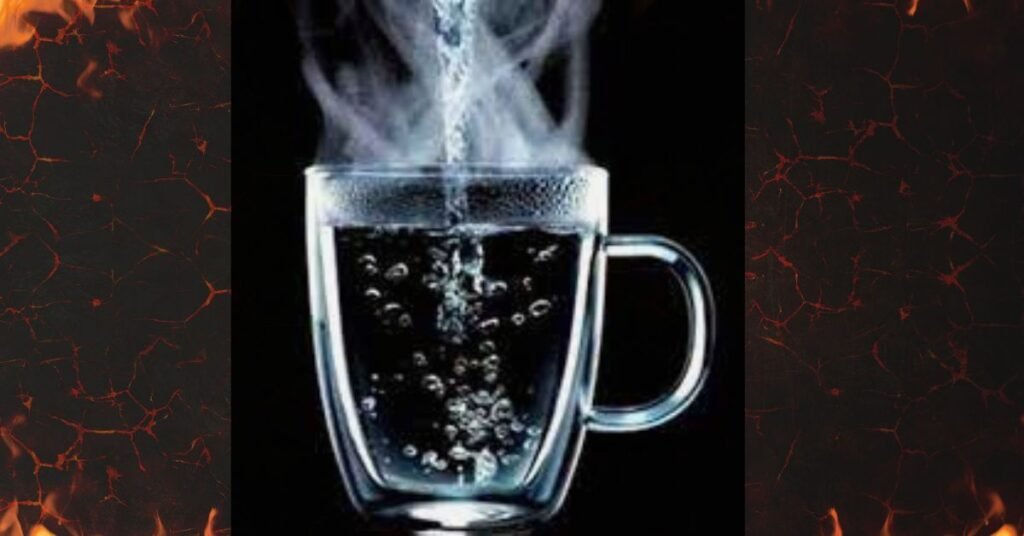
- Baking:
Extremely hot and unpleasant.
“It was a baking day at the beach, the sand felt like hot coals under our feet.”
- Scorching:
Intensely hot and burning.
“The scorching sun beat down on the crops, leaving them wilted.”
- Sultry:
Hot and humid, often uncomfortably so.
“The sultry evening air hung heavy, filled with the chirping of crickets.”
- Sweltering:
Excessively hot and humid, making it difficult to breathe.
“The city sweltered under the summer heat, with temperatures reaching record highs.”
- Tropical:
Hot and humid, similar to the climate of the tropics.
“The island boasted a tropical climate with lush rainforests and crystal-clear waters.”
- Lukewarm:
Slightly warm, not hot or cold.
“The lukewarm coffee sat on the desk, forgotten in the hustle of the morning.”
- Tepid:
Slightly warm, often unpleasantly so.
“The bathwater was tepid, not hot enough for a relaxing soak.”
- Balmy:
Pleasantly warm and mild.
“We enjoyed a balmy evening on the patio, listening to music and sipping lemonade.”
- Steaming:
Very hot, often producing visible steam.
“The cup of tea was steaming hot, sending wisps of vapor into the air.”
- Crackling:
Extremely hot, causing things to make crackling sounds.
“The fireplace crackled with heat, casting a warm glow on the room.”
- Spicy:
Intense and exciting.
“The new restaurant offered a menu full of spicy dishes, bursting with flavor.”
- Fiery:
Passionate and intense.
“She delivered a fiery speech that resonated with the audience.”
- Smoking:
Extremely attractive (informal).
“He was in a smoking hot suit, turning heads wherever he went.”
- Feverish:
Abnormally hot, often a sign of illness.
“He felt feverish and achy, so he decided to stay home from work.”
- Tropic:
Refers to the hot and humid regions near the equator.
“The tropic islands were a popular tourist destination, known for their beautiful beaches and vibrant coral reefs.”
15 other words to say Cold
- Chilly:
Slightly cold.
“The morning air was chilly, prompting me to wear a jacket.”
- Cool:
Pleasantly cold.
“The breeze was cool and refreshing on a hot summer day.”
- Nippy:
A bitingly cold sensation, often from the wind.
“There was a nippy wind blowing through the park.”
- Frigid:
Extremely cold.
“The blizzard created frigid temperatures, dipping below zero.”
- Frosty:
Covered in ice crystals due to coldness.
“The windowpane was frosty after a long night.”
- Freezing:
Extremely cold, causing discomfort.
“I was freezing after waiting for the bus in the snow.”
- Numbing:
So cold that it causes a loss of feeling.
“My fingers were numb from holding the ice pack for too long.”
- Bitterly cold:
Uncomfortably cold, often with wind or dampness.
“It was bitterly cold outside, making it hard to walk.”
- Perishing:
Extremely cold, emphasizing discomfort. (British English)
“We were perishing after getting caught in the rain without an umbrella.”
- Bleak:
Depressed and lacking warmth or hope.
“The landscape looked bleak and barren in the winter.”
- Unfeeling:
Lacking empathy or compassion.
“He gave her an unfeeling response, showing no concern for her situation.”
- Stoic:
Showing no emotion, often appearing cold or indifferent.
“She maintained a stoic expression even during the difficult news.”
- Wintry:
Characteristic of winter, implying coldness and harshness.
“The wintry weather brought snow and icy roads.”
- Inhospitable:
Unpleasant and difficult to live in, often due to extreme cold.
“The mountain peak was an inhospitable environment with biting winds and freezing temperatures.”
15 other words to say Ill
- Unwell:
Not feeling healthy or well.
“I’m feeling unwell and won’t be able to attend the meeting today.”
- Under the weather:
Slightly sick, but not severely ill.
“I’m a bit under the weather, so I might need to reschedule our lunch plans.”
- Indisposed:
Not feeling well enough to fulfill obligations or attend events.
“I apologize, but I’m indisposed and cannot make it to the event.”
- Ailing:
In poor health, often for a prolonged period.
“She’s been ailing for the past few days and needs rest.”
- Unhealthy:
In a state that is detrimental to physical well-being.
“It’s unhealthy for him to continue working while feeling this unwell.”
- Sick:
Generally unwell, often including nausea or other unpleasant symptoms.
“I woke up feeling sick this morning, so I’ll be staying home.”
- Lousy:
Feeling terrible, weak, and lacking energy.
“I feel lousy and don’t have the energy to go out tonight.”
- Run down:
Depleted of energy and feeling physically drained.
“I’ve been feeling run down lately and need some extra sleep.”
- Off-color:
Not quite oneself, possibly indicating the beginning of an illness.
“He seems a bit off-color, maybe he’s coming down with something.”
- Under the weather (informal):
Similar to the formal meaning, but with a more casual tone.
“I’m feeling a bit under the weather, so I’ll skip the gym today.”
- Headache:
A pain localized in the head, ranging from mild discomfort to severe throbbing.
“I have a terrible headache and can’t concentrate.
- Nausea:
A feeling of sickness and the urge to vomit.
“I’m feeling nauseous and might throw up.
- Feverish:
Having a body temperature higher than usual, often accompanied by chills.
“She’s feeling feverish and has chills.”
- Stomach ache:
A pain or discomfort originating from the abdomen.
“I have a bad stomach ache and can’t eat anything.”
- Cold:
A respiratory illness causes symptoms like congestion, sore throat, and coughing.
“I caught a cold and have a sore throat and a runny nose.”
15 other words to say Love
- Adore:
To have a deep love and admiration for someone.
“I absolutely adore spending time with my grandparents.”
- Cherish:
To hold something dear and precious.
“He cherishes every moment he has with his children.”
- Devote:
To dedicate yourself completely to someone or something.
“She is devoted to her work and helping others.”
- Enchanted:
To be captivated and filled with a magical feeling by someone.
“He was enchanted by her kindness and intelligence.”
- Fond:
Having a warm and affectionate feeling towards someone.
“I’m very fond of my neighbor, she’s always helpful.”
- Infatuated:
A strong but often short-lived passion or admiration for someone.
“He was infatuated with the new singer’s voice.”
- Treasure:
To value someone or something immensely.
“She treasures the memories they made together.”
- Besotted:
Completely captivated and foolishly in love with someone.
“He was utterly besotted with the actress and followed her everywhere.”
- Smitten:
Deeply affected by a sudden feeling of love or admiration.
“She was completely smitten by his charm and wit.”
- Care for:
To have a deep concern for someone’s well-being and happiness.
“He truly cares for his family and friends.”
- Idolize:
To worship or admire someone intensely, often to an excessive degree.
“Teenagers often idolize their favorite celebrities.”
- Admire:
To respect and appreciate someone’s qualities.
“I admire her strength and determination.”
- Respect:
To hold someone in high regard and treat them with courtesy.
“A healthy relationship requires mutual respect.”
- Adore (informal):
Can also be used in a more casual way to express strong affection.
“I adore those cute little puppies!”
- Sweet on someone (informal):
A playful way to express a mild romantic interest in someone.
“He seems a bit sweet on the new girl in his class.”
15 other words to say Use
- Utilize:
To use something effectively for a specific purpose. (Sentence: “We need to utilize all available resources to complete the project.”)
- Employ:
To put someone or something to work for a particular task.
“The company employs a diverse range of marketing strategies.”
- Leverage:
To take advantage of something to gain a benefit.
“He leveraged his experience to secure a leadership position.”
- Implement:
To put something into action or effect.
“The new policy will be implemented starting next week.”
- Apply:
To put something into practice or use it in a specific situation.
“She applied the principles learned in training to solve the problem.”
- Wield:
To handle or use something with power or skill.
“The writer wields language with extraordinary power.”
- Engage:
To involve oneself in something actively.
“Students were engaged in a lively discussion about the topic.”
- Harness:
To control and use something to one’s advantage.
“Scientists are trying to harness the power of renewable energy.”
- Deploy:
To strategically position or use something, often referring to resources or personnel.
“The fire department deployed additional equipment to combat the blaze.”
- Incorporate:
To include something as a part of a whole.
“The new curriculum incorporates innovative teaching methods.”
- Utilize (informal):
Can also be used in a more casual setting to simply mean “use.”
“Let’s utilize this time to brainstorm some ideas.”
- Put to use:
To find a practical application for something.
“We can finally put these unused tools to good use.”
- Draw on:
To access and use something, often referring to resources, knowledge, or skills.
“The artist drew on her creativity to produce a captivating piece.”
- Avail oneself of:
To take advantage of an opportunity or resource.
“Don’t hesitate to avail yourself of the support services offered.”
- Employ (informal):
Can also be used casually to simply mean “use.”
“I always employ this recipe for the best chocolate chip cookies.”
15 other words to say Deep
- Profound:
Having great significance or meaning.
The philosopher’s writings explored profound questions about the nature of reality.
- Abstruse:
Difficult to understand; obscure.
The scientific paper used abstruse terminology, making it hard for the general public to grasp.
- Intricate:
Having many complex and interconnected parts.
The intricate clockwork mechanism fascinated the children.
- Elusive:
Difficult to find, capture, or define.
Happiness is often an elusive concept, yet everyone strives for it.
- Penetrating:
Having or showing an ability to understand complex issues.
The detective’s penetrating questions revealed the truth behind the crime.
- Vigorous:
Having or showing a high degree of energy or force.
The activists held a vigorous protest against the proposed policy.
- Unfathomable:
Too mysterious or complex to be understood.
The vastness of the universe remains largely unfathomable to us.
- Haunting:
Persisting in the mind and memory in a way that is disturbing or unforgettable.
The haunting melody of the song stayed with him long after the performance ended.
- Resonant:
Having a deep or emotional effect; strongly sympathetic.
The author’s words resonated with the audience’s experiences.
- Stirring:
Exciting strong emotions, especially feelings of enthusiasm or admiration.
The athlete’s stirring performance inspired the entire team.
- Poignant:
Deeply affecting the feelings; intensely moving.
The soldier’s farewell letter to his family was poignant and heartfelt.
- Nuanced:
Subtle and well-distinguished; having delicate variations.
The artist’s nuanced brushstrokes captured the character’s emotions perfectly.
- Compelling:
Forcing attention or interest; irresistible.
The compelling mystery kept the reader guessing until the very last page.
- Profoundly:
To a great or significant degree.
He was profoundly affected by the loss of his close friend.
- Intricately:
In a complex or detailed way.
The spider intricately wove its web, catching its unsuspecting prey.
15 other words to say Faith
- Belief:
Conviction in the truth or existence of something, often without absolute proof. (Sentence: “She held a strong belief in the power of education.”)
- Conviction:
A strong feeling of certainty about something. (Sentence: “He spoke with conviction about the importance of protecting the environment.”)
- Trust:
Reliance on the integrity, strength, or ability of someone or something. (Sentence: “They placed their trust in the doctor’s expertise.”)
- Confidence:
A feeling of self-assurance arising from one’s abilities or qualities. (Sentence: “She approached the challenge with confidence.”)
- Certainty:
A state of having no doubt. (Sentence: “There was no certainty about the outcome of the election.”)
- Hope:
A feeling of expectation and desire for a positive outcome. (Sentence: “Despite the challenges, they clung to hope for a better future.”)
- Assurance:
A feeling of confidence or certainty. (Sentence: “The therapist offered them assurance that things would get better.”)
- Persuasion:
The act of convincing someone to believe in something. (Sentence: “His passion and logic were key factors in persuading the audience.”)
- Adherence:
The act of following something closely, often principles or beliefs. (Sentence: “Their adherence to ethical principles earned them respect.”)
- Tenacity:
The quality of holding firmly to a belief or purpose. (Sentence: “Her tenacity in the face of adversity was inspiring.”)
- Fidelity:
Loyalty or unwavering commitment to a person, cause, or belief. (Sentence: “He remained faithful to his ideals throughout his life.”)
- Conviction (religious):
A belief in the existence and teachings of a higher power. (Sentence: “His strong religious conviction guided his actions.”)
- Credence:
Belief in something, especially because of the reputation or authority of the source. (Sentence: “They gave credence to the scientist’s research findings.”)
- Allegiance:
Loyalty or commitment to a person, group, or cause. (Sentence: “The soldiers pledged their allegiance to their country.”)
- Acceptance:
The act of taking something as true, real, or inevitable. (Sentence: “Acceptance of their situation allowed them to move forward.”).
15 other words to say Modern
- Contemporary (adj.)
Existing, happening, or done at the same time as something else.
Sentence: The museum’s collection showcases contemporary art alongside historical pieces.
- Current (adj.)
Happening or existing now.
Sentence: The movie explores current social issues.
- Up-to-date (adj.)
Having the latest information or features.
Sentence: She uses up-to-date teaching methods in her classroom.
- State-of-the-art (adj.)
Using the latest technology or methods.
Sentence: The hospital boasts state-of-the-art medical equipment.
- Cutting-edge (adj.)
Very new and advanced.
Sentence: Scientists are developing cutting-edge treatments for cancer.
- Avant-garde (adj.)
New and unconventional, especially in art, music, or literature.
Sentence: The play was an avant-garde exploration of human relationships.
- Progressive (adj.)
Favoring modern ideas or methods.
Sentence: The company has a progressive approach to employee benefits.
- Contemporary (n.)
A person living at the same time as another person or event.
Sentence: Picasso was a leading contemporary of Matisse.
- Modernistic (adj.)
Of or relating to modernism, a cultural movement that began in the late 19th century.
Sentence: The building’s design reflects a modernist aesthetic.
- Nowaday (adv.)
In the present time.
Sentence: Nowadays, many people communicate through social media.
- Present-day (adj.)
Of or relating to the present time.
Sentence: Present-day society faces many challenges.
- Recent (adj.)
Having happened or been done a short time ago.
Sentence: There have been significant advances in technology in recent years.
- Novel (adj.)
New and original.
Sentence: The restaurant offers a novel take on traditional dishes.
- Emerging (adj.)
Beginning to exist or become known.
Sentence: Virtual reality is an emerging technology with vast potential.
- Fresh (adj.)
New and interesting.
Sentence: The director brought a fresh perspective to the classic story.
15 other words to say Round
- Circular (adj.)
Having the shape of a circle.
“The pizza was cut into eight circular slices.”
-
Spherical (adj.)
Having the shape of a ball.
“The Earth is a spherical planet.”
-
Orbicular (adj.)
Round, especially in a perfect way.
“The telescope captured an orbicular image of the moon.”
-
Rotund (adj.)
Round and plump.
“Santa Claus is often depicted with a rotund belly.”
-
Globular (adj.)
Roughly spherical in shape.
“A glob of water rolled off the counter.”
-
Annular (adj.)
Having the form of a ring.
“The giant wore an annular earring.”
-
Cylindrical (adj.)
Having the shape of a cylinder (round ends with a straight side).
“The vase had a long, cylindrical neck.”
-
Disc-shaped (adj.)
Flat and round like a disc.
“The flying disc soared through the air.”
-
Barrel-shaped (adj.)
Bulging in the middle and tapering at the ends, like a barrel.
“The cactus had a barrel-shaped body.”
-
Ring-shaped (adj.)
Having the form of a circle with a hole in the center.
“The children played with ring-shaped cookies.”
-
Rotundity (n.)
The quality of being round or plump.
“The sculptor captured the rotundity of the Buddha’s belly.”
-
Circumference (n.)
The total distance around the edge of a circle.
“We measured the circumference of the tree trunk.”
-
Orb (n.)
A spherical object.
“The crystal ball glowed like a magical orb.”
-
Globe (n.)
A spherical model of the Earth.
“We studied geography using a globe.”
-
Wheel (n.)
A circular object that revolves on an axle.
“The car rolled down the street on its wheels.”
15 other words to say Delicious
- Delectable :
Delightfully pleasant to the taste.
“The melt-in-your-mouth chocolate was delectable.”
- Mouthwatering :
So appealing that it makes your mouth water.
“The aroma of sizzling steak was mouthwatering.”
- Luscious :
Rich, pleasing, and delightful in taste or appearance.
“We devoured the luscious berries fresh from the farm.”
- Scrumptious :
Delicious in a delightful way. (Informal)
“The kids gobbled up the scrumptious cookies.”
- Divine :
Extremely good; heavenly.
“The chef’s signature dish was simply divine.”
- Tantalizing :
Arousing strong desire or interest.
“The tantalizing smell of spices filled the air.”
- Ambrosial:
Delightfully delicious; fit for the gods.
“The pasta dish was an ambrosial combination of flavors.”
- Savory :
Pleasantly salty or spicy in taste.
“The stew had a savory broth that warmed us up.”
- Appetizing :
Arousing the appetite; tempting.
“The colorful presentation of the salad was very appetizing.”
-
Delectable :
Delightfully pleasant to the taste.
(Already mentioned, but versatile enough to include twice)
-
Flavorful :
Having a strong, pleasant taste or smell.
“The stir-fry was bursting with flavorful vegetables.”
- Exquisite :
Extremely beautiful or delicate; of exceptional quality.
“The exquisitely prepared sushi was a feast for the eyes and the palate.”
- Moreish :
So delicious that you want more. (Informal, British)
“These cookies are so moreish, I can’t stop eating them!”
- Hit the Spot :
Exactly what you wanted or needed at that moment. (Informal)
“The cold lemonade hit the spot on that hot day.”
- Lip-Smacking :
So delicious that it makes you smack your lips in satisfaction. (Informal)
“That barbecue was lip-smacking good!”
15 other words to say Scared
- Holy:
Deeply reverent; inspiring awe and respect.
The ground was holy, off-limits to all but the priests.
- Hallowed:
Made holy or sacred by association with something revered.
The university’s hallowed halls echoed with history.
- Divine:
Of, relating to, or like God or a god.
The divine melody filled the temple.
- Consecrated:
Made sacred by a formal ceremony.
The newly consecrated church stood as a beacon of faith.
- Venerated:
Revered with great respect and devotion.
The elders were venerated for their wisdom.
- sanctified :
Made holy or sacred.
The ritual sanctified the offering.
- Revered:
Deeply respected.
The teacher was revered by her students.
- Inviolable:
Unbreakable or not to be broken or interfered with.
The oath was considered inviolable.
- Untouchable:
Not to be touched or disturbed.
Certain relics were considered untouchable.
- Mystical:
Having a spiritual or mysterious quality.
The mountain had a mystical aura.
- Numinous:
Inspiring awe or a sense of mystery.
The ancient ruins held a numinous power.
- Taboo:
Forbidden or sacred.
Certain areas of the forest were considered taboo.
- Holy of Holies:
The most sacred part of a religious sanctuary.
Only the high priest could enter the Holy of Holies.
- Venerated Ground:
A place considered especially sacred.
The battlefield was venerated ground for veterans.
- Sanctum:
A sacred or holy place.
The library was a sanctum of knowledge for scholars.
15 other words to say Horrible
- Dreadful:
Extremely unpleasant or bad.
The traffic jam was dreadful, causing us to miss our flight.
- Appalling:
Shockingly bad or unpleasant.
The working conditions in the factory were appalling.
- Repulsive:
Disgusting or offensive.
The smell of rotten garbage was repulsive.
- Heinous:
Wicked or evil.
The criminal committed a heinous act of violence.
- Abominable:
Extremely unpleasant or disgusting.
The weather was abominable, with rain and freezing temperatures.
- Atrocious:
Extremely wicked or cruel.
The dictator’s regime committed atrocious human rights violations.
- Lamentable:
Very unfortunate or regrettable.
It was a lamentable situation, as the family lost their home in the fire.
- Deplorable:
Deserving strong condemnation.
The state of the public hospitals was deplorable.
- Wretched:
Miserable or in a very bad condition.
They were living in wretched poverty.
- Abysmal:
bad or poor.
The team’s performance was abysmal during the game.
- Ghastly:
Shockingly unpleasant or frightening.
The sight of the car accident was ghastly.
- Grim:
Depressing or bleak.
The economic outlook was grim for many workers.
- Putrid:
Rotten or decaying and having a very unpleasant smell.
The putrid odor from the dumpster filled the street.
- Woeful:
Very sad or depressing.
The news reports were filled with woeful stories of refugees.
- Dire:
Very bad or serious.
The situation in the war-torn country was dire.
Conclusion
The power of words is incredible, and synonyms open up a whole world of creative expression! By using synonyms, you can avoid sounding repetitive, add depth and nuance to your writing, and find just the right word to capture exactly what you mean. So, keep exploring the wonderful world of synonyms, and have fun experimenting with your language!
Remember, even the most common words often have hidden treasures waiting to be discovered. So, next time you’re writing something, take a moment to explore synonyms and see what gems you can unearth!
I have also written post on Words and their use in different contexts. Click the link and read it; if you like it, leave a comment, and don’t forget to give it a 5-star rating…


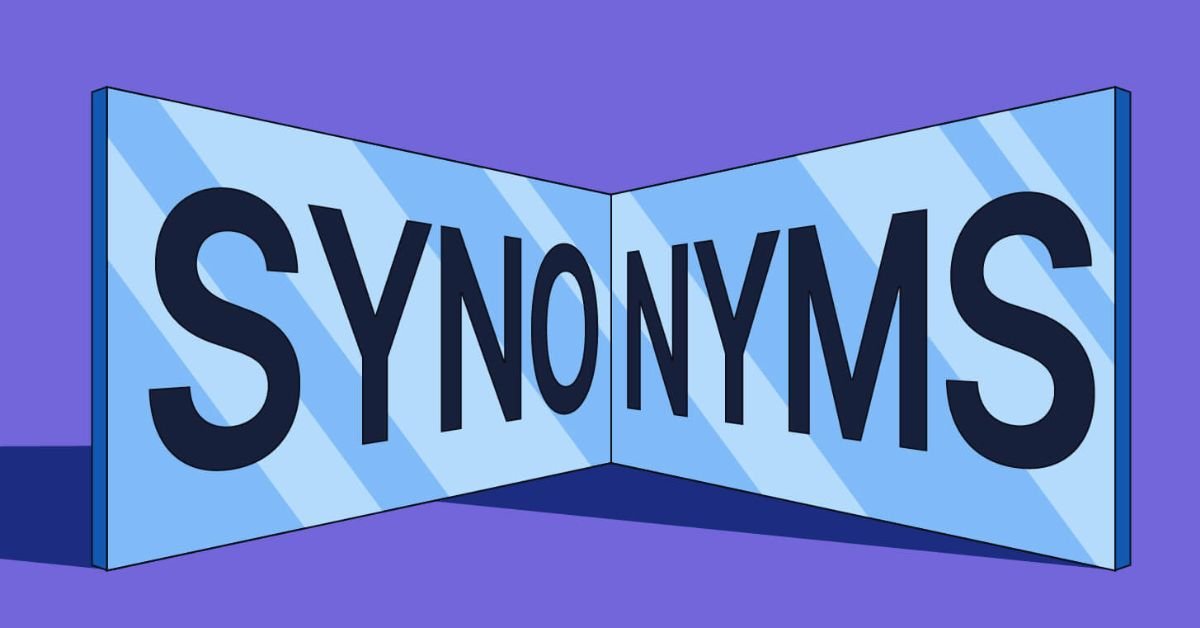



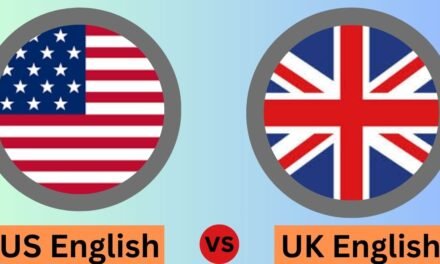



Just a smiling visitant here to share the love (:, btw outstanding design and style.
I am pleased that I noticed this web site, just the right info that I was looking for! .